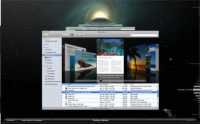Countdown to Leopard: Snapshots are a good thing

I took note of a recent thread about recovering trashed files on Apple's Mac OS X Server list. The discussion points out the goodness we will gain from the Time Machine utility due in Mac OS X 10.5, a k a Leopard. And it also reveals a common user error with recovery software.
The originator of the thread recounted a goof that most of us have made one time or another: trashing files and folders by accident (or accidentally on purpose). Now, if we back up or archive our data regularly, then there's a chance that the deleted files may still be accessible. Or not.

The discussion in the thread moved to the effectiveness of file recovery tools to bring back the lost data. These programs scan a storage device for identifiable files and then recover them to another drive altogether. You can search for specific files and file types.
I have had good experience with Prosoft Engineering's Data Rescue II. It costs $99 and comes with a boot CD for emergencies. The company has a long experience with the Mac and offered a version of the product in the pre-Mac OS X days.
Meanwhile, a couple of weeks ago, SubRosaSoft.com released Version 6.0 of FileSalvage, its $89.95 file recovery tool. I've never used this software but it sounds very capable.
One new feature in the update lets users add a new file type to the list of supported files by dragging some examples onto the program. FileSalvage 6.0 then analyses the files and creates a new profile.
In addition, SubRosaSoft said that FileSalvage 6 can also dig out files from "bento" formats, such as e-mail folders or some cache holders. That's an interesting feature.
Yet, if your system has already written over the data you need, you will be out of luck, whatever the capabilities of the software. SubRosaSoft's online docs drill this "tip" several times.
As I read through some online discussions on software download sites, I saw a picture of mixed success with these recovery tools. (Thankfully, the few times I've had to use Data Rescue, it's worked for me.) Could these programs be having a harder time recovering files than before?
A post on the Mac OS X Server list suggested as much.
Yet, according to an Apple technical note on disk optimization, Mac OS X by its nature should help us when we need to find deleted files.
Mac OS Extended formatting (HFS Plus) avoids reusing space from deleted files as much as possible, to avoid prematurely filling small areas of recently-freed space.
Perhaps it's our perception that's the problem? Do some users think of these recovery tools as a safety net? They believe that if something goes really wrong with their hardware or system or whatever, then they will be able to get their files back. Of course, this is a mistake.
The chance of recovery is like rolling a pair of dice. Sometimes you find the data you need and other times you will crap out.
The safety net for your data is a comprehensive backup and archive plan. And even better, with Leopard Mac users will gain snapshots. This will be a big step forward in reliability for everyday users.
As the thread continued on the Mac OS X Server list, yet another issue with file-recovery and directory repair programs was revealed.
In the thread, Jeremy Poff said he had just searched for a file and hadn't had much luck.
"Only 20 or 30 files showed, half them had no chance of recovery and half had a poor chance. Finding so few files available for recovery, I searched the Internet for explanations," he complained.
He said that OS X was being more aggressive in filling newly released space on the drive. But he also admitted that he was using Norton Systemworks 3.0/Mac for his file search and recovery.
Dude: NSW3 doesn't support Tiger. This was the right idea but the wrong software. So, recovery was doomed before the process even began.
But Poff's mistake is something we all do at times. It's a hateful problem with these format-level utilities. Apple and developers can make small changes to formats, services and data structures that can fool older versions of these tools. The user thinks he or she has the latest version and runs the software, bringing erratic results or worse, data loss.
So, it's important in the lull before disaster strikes to make sure you have the right tools for the job and the latest versions. Please don't wait to check until you're under pressure to recover important data.
If it works as expected, Leopard's Time Machine will help most of us with the quick recovery of accidentally deleted files. It's interface is understandable and usable by most people. We will see what the experience will be when its in use by millions of us dummies.
Still, I have have no doubt that we will still need our data recovery tools for the times when bad things happen.